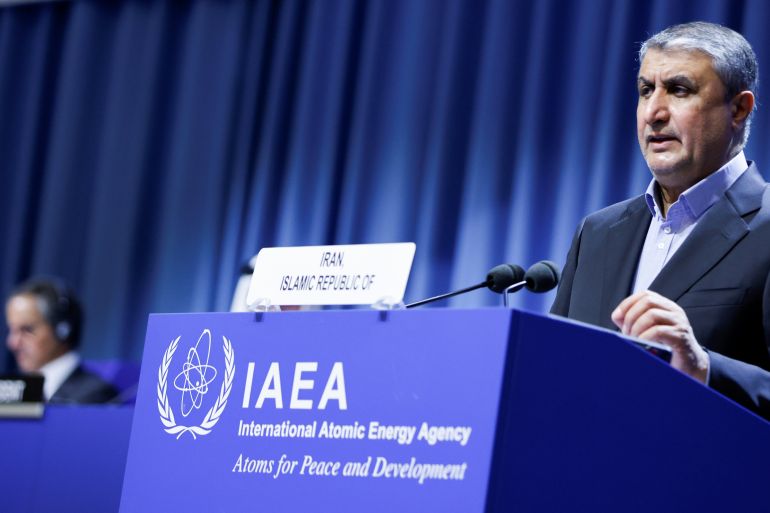Iran’s nuclear chief reports jump in 20 percent enriched uranium
Head of Atomic Energy Organization of Iran says Iran has produced over 120kg of 20 percent enriched uranium.

Tehran, Iran – Iran has produced more than 120 kilogrammes (265 pounds) of 20 percent enriched uranium, according to its nuclear chief, a considerable increase compared with the global nuclear watchdog’s latest report.
In an interview broadcast on state television late on Saturday, Atomic Energy Organization of Iran (AEOI) head Mohammad Eslami said it has more than complied with a December parliament law that demanded production of 120 kilogrammes of 20 percent enriched uranium in one year.
Keep reading
list of 3 itemsUS announces new Iran sanctions, targeting Omani ‘broker’
US calls for ‘imminent’ return to nuclear talks with Iran
“We have surpassed the 120-kilogramme figure and in this regard, we’re ahead of schedule,” he said.
Eslami said the research reactor in Tehran was supposed to receive the fuel from other parties to the country’s 2015 nuclear deal, the Joint Comprehensive Plan of Action (JCPOA), but that it was not delivered.
“If we hadn’t started producing this much fuel ourselves, this issue would’ve turned into one of the problems today,” he said.
In a report last month, the International Atomic Energy Agency (IAEA) said Iran’s stockpile of 20 percent enriched uranium stood at more than 84 kilogrammes (185 pounds), up from 62.8 kilogrammes (138 pounds) three months prior.
Advancing nuclear programme
Under the terms of the JCPOA – which the United States unilaterally abandoned in 2018, leading Iran to gradually scale back its own commitments – Iran was to cap enriching uranium at 3.67 percent, with the exception of its research reactor activities.
Sabotage attacks on Iranian nuclear sites and the November assassination of a top nuclear scientist – all of which Iran has blamed on Israel – prompted the hardline parliament to ratify a new law, which calls for ramped-up nuclear activity until the US sanctions are lifted.
Iran has since begun enriching uranium up to 60 percent, utilised more centrifuges, produced uranium metal and is building more advanced centrifuges.
Western powers and Israel say they are concerned Iran may be racing for a nuclear bomb, but Iranian officials maintain they have never sought a nuclear weapon.
“The production of uranium metal may be considered a danger in the eyes of the Americans, but we will do what is necessary for our national interests,” Eslami said during the interview on Saturday.
No access to Karaj facility
The nuclear chief also pointed to a disagreement Iran had with the IAEA last month over an agreement reached in Tehran that would allow inspectors to service monitoring cameras at nuclear sites and replace their memory cards.
Eslami said after Iran insisted it would not grant access to a site in Karaj that was subject to a sabotage attack earlier this year, the agency did not pursue the matter.
The nuclear watchdog had previously said it needed access to the site to replace monitoring equipment that was damaged or destroyed during the attack on the facility.
The IAEA “did not take a stance or condemn the terrorist operation on this site, which practically encourages these terrorist attacks”, he said, adding that the site continues to be under judicial and security investigations.
The US and European powers party to the nuclear deal continue to call on Iran to return to Vienna in order to resume talks aimed at restoring the JCPOA.
Top officials in the administration of President Ebrahim Raisi have said they are reviewing the files of six rounds of negotiations that ended in late July, and will return to the Austrian capital soon. But they have also said they will only engage in negotiations that will lead to the lifting of US sanctions.